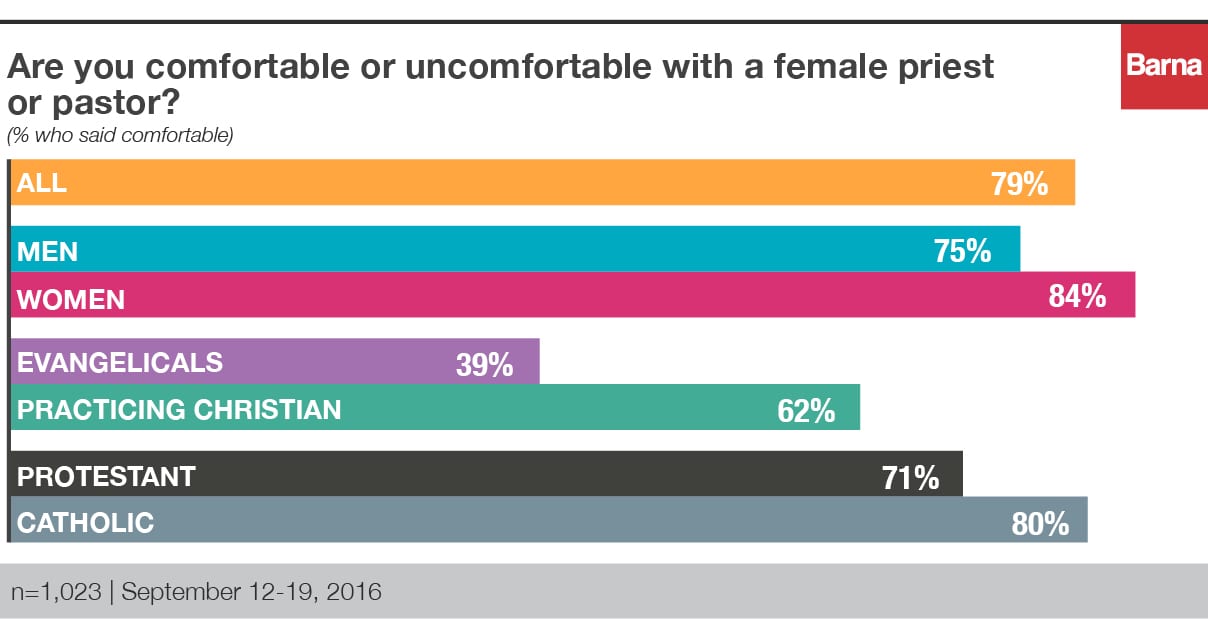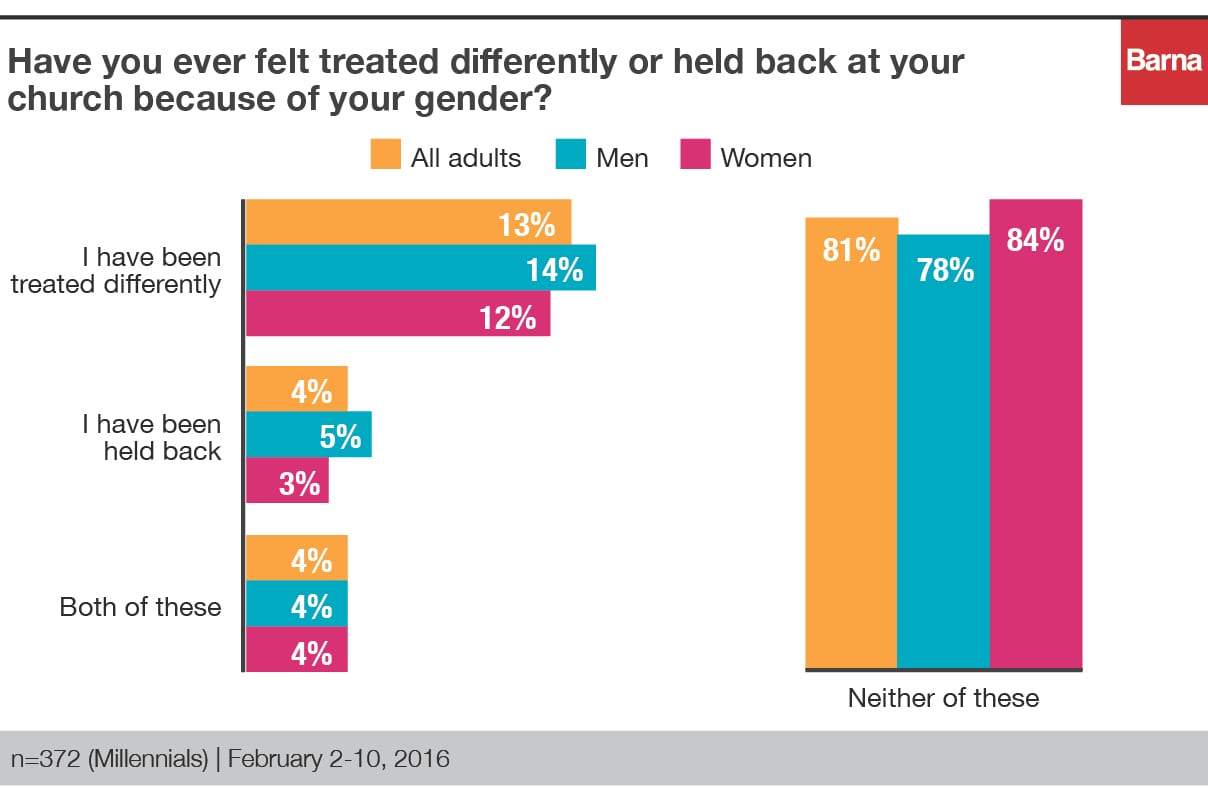Women Least Accepted in MinistryThough large numbers of Americans embrace the presence of female leadership at work and in politics, they are least comfortable, comparatively, with women leading the church. But the reality remains: Most are accepting of a female priest or pastor (79%). As is the trend, more women than men are comfortable with a female in the pulpit (84% vs. 75%). Evangelicals by definition (see below) have a more traditional interpretation of the scriptures, particularly concerning female ordination, and so express by far the lowest levels of comfort (39%). Practicing Christians—which represent a much larger segment of the U.S. Christian population than evangelicals—were more affirming with slightly fewer than two-thirds (62%). Surprisingly, Catholics (80%) are slightly more comfortable with a female priest or pastor than Protestants (74%). So while the general population are affirming of female priests and pastors, there are differences in the various factions of the Church.
 In Barna’s research for The State of Pastors, we found that the percentage of Protestant senior pastors who are women, though still small (9%), is triple the percentage of 25 years ago. Though generally healthy and satisfied in ministry, these women are more likely to express they were unprepared for the expectations of perfection (18%, compared to 8% of male pastors) or the sense that they must do everything (15%, compared to 5% of male pastors). Most of those women lead mainline congregations rather than the evangelical churches that demonstrate lower levels of comfort with female ministers. Though non-mainline churches welcome women’s gifts in various other church leadership positions, just 44 percent of non-mainline pastors say their denomination, church network or congregation ordains women for senior pastoral leadership, compared to virtually all mainline pastors (99%). Even though they lack representation in the pulpit, very few Millennials feel treated differently or held back at their church because of their gender. Surprisingly, Millennial women are actually equally as likely than men to feel they have been treated differently (12% vs. 14%), or held back (3% vs. 5%).
In Barna’s research for The State of Pastors, we found that the percentage of Protestant senior pastors who are women, though still small (9%), is triple the percentage of 25 years ago. Though generally healthy and satisfied in ministry, these women are more likely to express they were unprepared for the expectations of perfection (18%, compared to 8% of male pastors) or the sense that they must do everything (15%, compared to 5% of male pastors). Most of those women lead mainline congregations rather than the evangelical churches that demonstrate lower levels of comfort with female ministers. Though non-mainline churches welcome women’s gifts in various other church leadership positions, just 44 percent of non-mainline pastors say their denomination, church network or congregation ordains women for senior pastoral leadership, compared to virtually all mainline pastors (99%). Even though they lack representation in the pulpit, very few Millennials feel treated differently or held back at their church because of their gender. Surprisingly, Millennial women are actually equally as likely than men to feel they have been treated differently (12% vs. 14%), or held back (3% vs. 5%).
What the Research Means“With nearly half of the paid workforce now made up of women, it might seem as though the job is done,” says Roxanne Stone, editor in chief at Barna Group. “But there are still significant growing pains on the journey toward gender parity. For most women, these are less about representation in the workplace and more about expectations and fair treatment. In our research, women point out inequality in promotions and in pay. While the American public may be comfortable with women in senior leadership positions, the facts are that women are still under-represented in executive suites and paid less than men for the same jobs. Additionally, women continue to disproportionately feel the tension of work/family balance.
“Among twentysomething women, we have seen a prioritizing of career over marriage or family,” continues Stone. “While this is a widespread cultural shift, for women some of this desire comes from a knowledge that it’s difficult to do both—to be both mother and manager—and so they want to spend their twenties establishing their careers, hoping this will allow them more flexibility and security when they do decide to become parents.
“This study—and the cultural realities it uncovers—are immanently significant for the church,” insists Stone. “More than half of most congregations are women. They are increasingly part of the workforce; they are rising in the ranks at work and they are finding immense value in their jobs. Yet, they often feel conflicted when it comes to their work and motherhood. How can the church offer vocational discipleship for women (and men) that includes both occupation and parenting? How can the church encourage men to take on more of the household duties and emotional labor associated with family life? What support can the church offer for stressed-out, working moms and dads?
“As evidenced by the research, the issue of women in leadership is a complicated one for many evangelicals,” says Stone. “There is a long history among evangelicals of emphasizing motherhood and family as a woman’s primary calling. While the broader culture, and much of the Christian church, has shifted away from this, evangelicals seem more reluctant to do so. This reluctance is often tied to a scriptural reading that insists men are to occupy primary leadership positions within the family and church and, by extension, society.
“Evangelicals aside, most other practicing Christians would be comfortable with a woman in the pulpit,” Stone continues. “This means many practicing Christians attend churches where they disagree with (or do not understand) the theological stance against women in leadership. This is likely to become more of an issue for churches as women continue to gain equality in other spheres. We have already seen more churches shifting to allow women in senior leadership, and the number of female senior pastors has grown considerably in the last few decades. However, for churches who continue to hold a traditional position on women in leadership, it will become more important for them to articulate their theology for their members. Women and men in their congregations deserve to know what their church believes and why they believe it. Because such a stance will feel increasingly irrelevant and outdated, churches and members need to understand why such a theology still exists.”
Comment on this research and follow our work:
Twitter: @davidkinnaman | @roxyleestone | @barnagroupFacebook: Barna Group
Twitter: @davidkinnaman | @roxyleestone | @barnagroupFacebook: Barna Group
About the ResearchState of PastorsThis study was conducted on behalf of Pepperdine University. A total of 900 Protestant senior pastors were interviewed by telephone and online from April through December 2015. Pastors were recruited from publicly available church listings covering 90 percent of U.S. churches that have a physical address and a listed phone number or email address. Churches selected for inclusion were called up to five times at different times of the day to increase the probability of successful contact. The sample error for this study is plus or minus 3.1 percentage points, at the 95% confidence level.
OmniPollInterviews with U.S. adults included 1023 web-based surveys conducted among a representative sample of adults over the age of 18 in each of the 50 United States. The survey was conducted in September of 2016. The sampling error for this study is plus or minus 3 percentage points, at the 95% confidence level. Minimal statistical weighting was used to calibrate the sample to known population percentages in relation to demographic variables.
Millennial PollInterviews with U.S. adults included 803 web-based surveys conducted among a representative sample of Millennials in each of the 50 United States. The survey was conducted in February of 2016. The sampling error for this study is plus or minus 3.3 percentage points, at the 95% confidence level. Minimal statistical weighting was used to calibrate the sample to known population percentages in relation to demographic variables.
Millennials: Born between 1984 and 2002
Gen-Xers: Born between 1965 and 1983
Boomers: Born between 1946 and 1964
Elders: Born between 1945 or earlier
Gen-Xers: Born between 1965 and 1983
Boomers: Born between 1946 and 1964
Elders: Born between 1945 or earlier
Practicing Christian: Those who attend a religious service at least once a month, who say their faith is very important in their lives and self-identify as a Christian.
Evangelicals: meet nine specific theological criteria. They say they have made “a personal commitment to Jesus Christ that is still important in their life today,” that their faith is very important in their life today; believe that when they die they will go to Heaven because they have confessed their sins and accepted Jesus Christ as their Savior; strongly believe they have a personal responsibility to share their religious beliefs about Christ with non-Christians; firmly believe that Satan exists; strongly believe that eternal salvation is possible only through grace, not works; strong agree that Jesus Christ lived a sinless life on earth; strong assert that the Bible is accurate in all the principles it teaches; and describing God as the all-knowing, all-powerful, perfect deity who created the universe and still rules it today. Being classified as an evangelical is not dependent on church attendance, the denominational affiliation of the church attended or self-identification. Respondents were not asked to describe themselves as “evangelical.”
About BarnaBarna research is a private, non-partisan, for-profit organization under the umbrella of the Issachar Companies. Located in Ventura, California, Barna Group has been conducting and analyzing primary research to understand cultural trends related to values, beliefs, attitudes and behaviors since 1984.


No comments:
Post a Comment